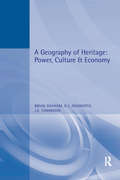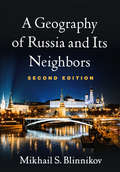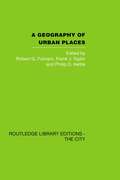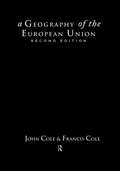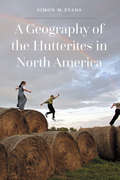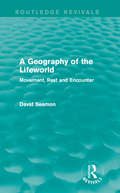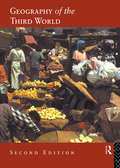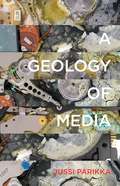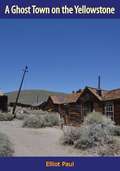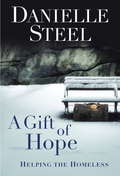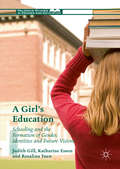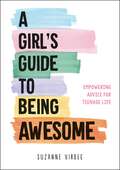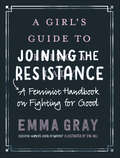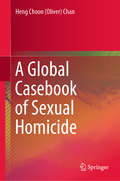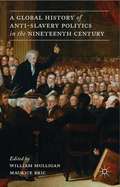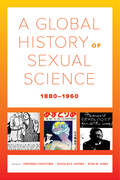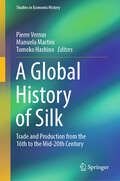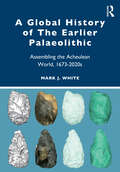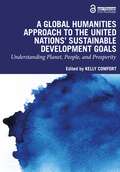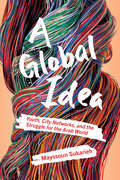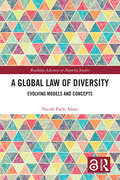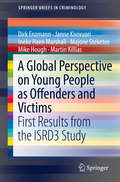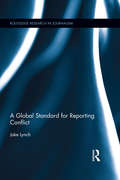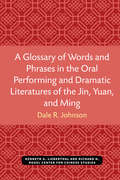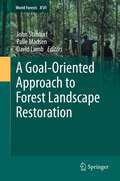- Table View
- List View
A Geography of Heritage: Power, Culture And Economy (A\hodder Arnold Publication)
by Brian Graham Greg Ashworth John TunbridgeThe concept of heritage relates to the ways in which contemporary society uses the past as a social, political or economic resource. However, heritage is open to interpretation and its value may be perceived from differing perspectives - often reflecting divisions in society. Moreover, the schism between the cultural and economic uses of heritage also gives rise to potential conflicts of interest. Examining these issues in depth, this book is the first sustained attempt to integrate the study of heritage into contemporary human geography. It is structured around three themes: the diversity of use and consumption of heritage as a multi-sold cultural and economic resource; the conflicts and tensions arising from this multiplicity of uses, producers and consumers; and the relationship between heritage and identity at a variety of scales.
A Geography of Russia and Its Neighbors, Second Edition
by Mikhail S. BlinnikovAuthoritative yet accessible, the definitive undergraduate text on Russian geography and culture has now been thoroughly revised with the latest data and hot topics, such as the political crisis in Ukraine and the annexation of Crimea and Sevastopol. Thematic chapters provide up-to-date coverage of Russia's physical, political, cultural, and economic geography. Regional chapters focus on the country's major regions and the other 14 former Soviet republics. Written in a lucid, conversational style by a Russian-born international expert, the concise chapters interweave vivid descriptions of urban and rural landscapes, examinations of Soviet and post-Soviet life, deep knowledge of environmental and conservation issues, geopolitical insights, engaging anecdotes, and rigorous empirical data. Over 200 original maps, photographs, and other figures are also available as PowerPoint slides at the companion website, many in color. New to This Edition *Separate chapter on Ukraine and Crimea. *Timely topics--the political crisis in Ukraine and annexation of Crimea and Sevastopol; the return of Putin as president; climate change and environmental degradation; economic slowdown; political shifts in the republics; the role of Russian-backed forces in Syria, Libya, and Central African Republic; changes in Russia–United States relations; and more. *Thoroughly updated population, economic, and political data. *80 new or updated figures, tables, and maps. Pedagogical Features *End-of-chapter review questions, suggested assignments, and in-class exercises. *Within-chapter vignettes about Russian places, culture, and history. *End-of-chapter Internet resources and suggestions for further reading. *Companion website with all figures and maps from the book, many in full color.
A Geography of Urban Places (Routledge Library Editions)
by Robert G. Putnam Frank J. Taylor Philip G. KettleThis book presents a selection of readings to present varied opinions, approaches and reports from various international professional journals. Among the journals represented are: Regional Science Association Journal, The Canadian Geographer, The Annals of the American Association of Geographers, Economic Geography, Landscape, Journal of Soil and Water Conservation and Land Economics. This book was first published in 1970.
A Geography of the European Union
by John ColeCan the European Union continue to grow and also converge? Is uniformity within the union desirable? The European Union has grown into a supranational entity formed from a mosaic of diverse regions. Its enlargement to encompass a number of Central European countries seems only a matter of time. With the EU's political and economic importance growing globally, the Union's influence is increasingly being felt within its Member States. A new geography is emerging with pressures to reduce regional disparities by a process of convergence. A Geography of the European Union provides a comprehensive introduction to the European Union, its identity, problems and prospects. Focusing on the key issues of integration and enlargement, the authors examine the major economic, social, environmental and political aspects of the EU, both in terms of its individual regions and as a system of interdependent states that form the single EU entity. Assessment of controversial issues is frank: problems of unemployment, social stress, ageing and the place of women are covered objectively, prompting readers to form their own interpretations. This completely revised and expanded 2nd Edition includes a wealth of new illustrations, data and analysis. Setting the EU within a broader European and global context, this book provides a comprehensive introduction to the changing geography of the European Union and its place in a rapidly changing world.
A Geography of the Hutterites in North America
by Simon M. EvansA Geography of the Hutterites in North America explores the geographical diffusion of the Hutterite colonies from the &“bridgehead&” of Dakota Territory in 1874 to the present distribution across North America. Looking further than just maps of location, this book analyzes the relationship between parent and daughter colonies as the Hutterite population continues to grow and examines the role of cultural and demographic forces in determining the diffusion process. Throughout this geographical analysis, Simon M. Evans pays due attention to the Hutterites&’ contribution to the cultural landscape of the Canadian Prairies and the American Great Plains, as well as the interactions that the Hutterites have with the land, including their agricultural success. With over forty years of research and personal interactions with more than a hundred Hutterite colonies, Evans offers a unique insight into the significant role that the Hutterites have in North America, both currently and historically. This study goes beyond the history, life, and culture of this communal brotherhood to present a new geographical analysis that reports on current and ongoing research within the field. The first narrative to be published regarding Hutterites in nearly a decade, A Geography of the Hutterites in North America is a valuable resource for scholars and students alike.
A Geography of the Lifeworld: Movement, Rest and Encounter (Routledge Revivals)
by David SeamonWithin the modern Western lifestyle increasing conflict is becoming apparent between that patchwork of isolated points such as the home or the office, which are linked by a mechanical system of transportation and communication devices, and a growing sense of homelessness and isolation. This work, first published in 1979, adopts a phenomenological perspective illustrating that this malaise may have partial roots in the deepening rupture between people and place. Whereas the problems of terrestrial space may have been overcome technologically and economically, it has been less successful regarding people. Experience indicates that people become bound to locality, and the quality of their life is thus reduced if these bonds are disrupted or broken in any way. The relationship between community and place is investigated, as is the opportunity for improving the environment, both from a human and an ecological perspective. This book will be of interest to students of human geography.
A Geography of the Third World
by C. G Clarke Dr J Dickenson J. P Dickenson W.T.S Gould S Mather Sandra Mather Prof R Prothero R. M Prothero D. J Siddle C. T Smith Mr C Smith E. Thomas-HopeThe label of "Third World" covers half the land surface and three quarters of the population of the planet. The problems and potential of this region and its peoples are attracting increasing concern and interest.Fully revised and updated this edition includes: * a wealth of photographic and line illustrations* boxed case studies* chapter summaries* guides to further readingIssues of increasing concern at the end of the twentieth century are fully addressed - for example, the widening gap in economic performance between countries in the Third world and the assertion of national cultures in the face of globalisation. New material on gender issues and the environmental impact of development has been included.
A Geology of Media (Electronic Mediations #46)
by Jussi ParikkaMedia history is millions, even billions, of years old. That is the premise of this pioneering and provocative book, which argues that to adequately understand contemporary media culture we must set out from material realities that precede media themselves—Earth&’s history, geological formations, minerals, and energy. And to do so, writes Jussi Parikka, is to confront the profound environmental and social implications of this ubiquitous, but hardly ephemeral, realm of modern-day life.Exploring the resource depletion and material resourcing required for us to use our devices to live networked lives, Parikka grounds his analysis in Siegfried Zielinski&’s widely discussed notion of deep time—but takes it back millennia. Not only are rare earth minerals and many other materials needed to make our digital media machines work, he observes, but used and obsolete media technologies return to the earth as residue of digital culture, contributing to growing layers of toxic waste for future archaeologists to ponder. He shows that these materials must be considered alongside the often dangerous and exploitative labor processes that refine them into the devices underlying our seemingly virtual or immaterial practices.A Geology of Media demonstrates that the environment does not just surround our media cultural world—it runs through it, enables it, and hosts it in an era of unprecedented climate change. While looking backward to Earth&’s distant past, it also looks forward to a more expansive media theory—and, implicitly, media activism—to come.
A Ghost Town on the Yellowstone
by Elliot PaulThe charm of Elliot Paul’s storytelling is that nowhere does he allow relevancy to cloud the brilliance of his art. Mr. Paul seeks to pleasure you. Like a skilful skater on a frozen pond he cuts intricate figures on memory’s gleaming surface. If, here and there, the ice is thin he chances it rather than interrupt the onlooker’s delight. To Mr. Paul, the figure’s the thing.So, in A Ghost Town on the Yellowstone, which was first published in 1948, Mr. Paul reaches back to the year 1907 and to his youthful adventures on a project of the United States Reclamation Service in Montana. With him you start on one of the oddest stagecoach rides in history—a ride in which no matter how the passengers change at various stops their number is always thirteen, a circumstance to make the driver consult his whisky jug more frequently than usual. The hapless coach—jinxed to the whiffletrees, overturns, dumps its passengers into the sagebrush and thus precipitates the founding of the town of Trembles. Thanks to Mr. Paul’s keen observation (vitamin enriched and thoroughly irradiated) you meet the first citizens of Trembles—a saloonkeeper, two Chinese, a scissorbill, and a woman somewhat less ancient than the profession she follows. Thenceforth you participate in some of the most astonishing, humorous and touching events ever to take place in that part of the Wild West. To tell you more would be to cheat you of your full quota of agreeable surprises.
A Gift of Hope
by Danielle SteelIn her powerful memoir His Bright Light, #1 New York Times bestselling author Danielle Steel opened her heart to share the devastating story of the loss of her beloved son. In A Gift of Hope, she shows us how she transformed that pain into a campaign of service that enriched her life beyond what she could imagine. For eleven years, Danielle Steel took to the streets with a small team to help the homeless of San Francisco. She worked anonymously, visiting the "cribs" of the city's most vulnerable citizens under cover of darkness, distributing food, clothing, bedding, tools, and toiletries. She sought no publicity for her efforts and remained anonymous throughout. Now she is speaking to bring attention to their plight. In this unflinchingly honest and deeply moving memoir, the famously private author speaks out publicly for the first time about her work among the most desperate members of our society. She offers achingly acute portraits of the people she met along the way--and issues a heartfelt call for more effective action to aid this vast, deprived population. Determined to supply the homeless with the basic necessities to keep them alive, she ends up giving them something far more powerful: a voice. By turns candid and inspirational, Danielle Steel's A Gift of Hope is a true act of advocacy and love.
A Girl's Education: Schooling and the Formation of Gender, Identities and Future Visions (Palgrave Studies in Gender and Education)
by Judith Gill Katharine Esson Rosalina YuenThis book argues that educators and the general public have become complacent about girls' education as a consequence of the more recent fuss about problems for boys. After an analysis of persistent disquiet about girls' lifestyles, it uses theories of gender and education to demonstrate that girls are being produced in contradictory ways in current schooling. Many girls develop a sense of themselves through close connection with friendship groups but schooling processes typically require them to adopt the position of competitors in the end-of-school rankings and to act out their individualized positions in imagining themselves into the future. Ultimately the work offers insight and understanding leading to a less divisive educational pathway for girls.
A Girl's Guide to Being Awesome: Empowering Advice for Teenage Life
by Suzanne VirdeeLet’s face it: growing up is confusing. This book is here to act as your go-to guide on everything from social media to sexting and from body image to self-esteem. Acting as your personal cheerleader, this book will teach you everything you need to navigate your teens with sass and style.
A Girl's Guide to Joining the Resistance: A Feminist Handbook on Fighting for Good
by Emma GrayAn illustrated big-sister's guide to activism—the perfect gift for young feminists and long-time observers looking to enter the fray.Have recent events given you pause? Does Trump’s America make you fearful for the future of women? Do you want to become more involved in helping to preserve women’s rights but aren’t sure how? In A Girl’s Guide to Joining the Resistance, Emma Rose Gray, Executive Editor at The Huffington Post, outlines all that young women need to know on pivotal women’s rights issues and offers a blueprint for those who want to take a stand and participate in the cause. This groundbreaking book includes: • Background information on key issues so you can choose where you most want to take a stand.• A guide for learning about the first Amendment and how to choose good news sources and make sure you’re getting quality information.• Practical instructions on how to get involved and stay involved, with examples from the author’s own experience organizing the successful “Watch Us Run” conference. • Instructions for how to talk to your friend who says she’s “just not that political” and your relatives whose beliefs conflict with your own. • Advice for self-care and how to stay involved without exhausting yourself. • Extensive back-matter including numbers to call, organizations to email and donate to, and scripts for reaching out to representatives and organizations. • Interviews with experienced activists including senator Elizabeth Warren, actress Amber Tamblyn, actress Marlo Thomas, Women’s March Co-Chair Carmen Perez, Mother of the Movement Lucy McBath, Black Lives Matter creator Alicia Garza, People for Bernie Founder Winnie Wong, and former assistant to President Obama Tina Tchen. Featuring original 2-color illustrations throughout by New York Magazine’s Eva Hill, A Girl’s Guide to Joining the Resistance illuminates why the time has never been more important than now to get involved in helping to ensure women’s rights are protected for the current and future generations of women.
A Global Casebook of Sexual Homicide
by Heng Choon ChanThis book comprehensively discusses 13 infamous cases of serial and non-serial sexual homicide committed around the globe in the past four decades (1974–2010). Offering a psycho-criminological perspective, it analyzes the cases theoretically (i.e., contributing and precipitating factors, and offender typology) and considers the practical implications (i.e., investigative and crime-preventive measures, and social services). The first book to offer a glimpse of this topic from a global perspective, it adopts a unique approach—case background and critical analysis. As such it is a valuable source of reference for scholars, clinicians, and law enforcement practitioners wanting to gain a better understanding of this type of violent offender.
A Global History of Anti-slavery Politics in the Nineteenth Century
by William Mulligan Maurice BricThe abolition of slavery across large parts of the world was one of the most significant transformations in the nineteenth century, shaping economies, societies, and political institutions. This book shows how the international context was essential in shaping the abolition of slavery.
A Global History of Sexual Science, 1880–1960 (California World History Library #26)
by Veronika Fuechtner, Douglas E. Haynes, and Ryan M. JonesStarting in the late nineteenth century, scholars and activists all over the world suddenly began to insist that understandings of sex be based on science. As Japanese and Indian sexologists influenced their German, British, and American counterparts and vice versa, sexuality, modernity, and imaginings of exotified "Others" became intimately linked. The first anthology to provide a worldwide perspective on the birth and development of the field, A Global History of Sexual Science contends that actors outside of Europe—in Asia, Latin America, and Africa—became important interlocutors in debates on prostitution, birth control, and transvestism. Ideas circulated through intellectual exchange, travel, and internationally produced and disseminated publications. Twenty scholars tackle specific issues, including the female orgasm and the criminalization of male homosexuality, to demonstrate how concepts and ideas introduced by sexual scientists gained currency throughout the modern world.
A Global History of Silk: Trade and Production from the 16th to the Mid-20th Century (Studies in Economic History)
by Tomoko Hashino Manuela Martini Pierre VernusThis book explores the global development of the production and trade of silk and related industries from a historical perspective. From the sixteenth to the twentieth century, it takes long-term movements and global dynamics into account. Covering a wide geographical area, including East-Asia, Northern and Southern Europe, and North-America, the respective contributions examine economic activities related to silk production, silk processing, trading and consumption of silk and silk fabrics, while also highlighting diverse paths of industrialization and economic development. The book is divided into three parts, the first of which features contributions on silk markets and trade, covering topics such as auction sales and Sino-European trade. The second part addresses issues of work organization, institutional developments and the gendered division of labour, discussing topics such as systems of home-based and factory production and the organization of quality control. In turn, the third part highlights technological innovations and knowledge transfer. This book appeals to scholars and students of economic history who are interested in a better understanding of the key features and patterns in the development of the silk industry and trade and, more widely, in the global economic history of the early modern and modern periods.
A Global History of The Earlier Palaeolithic: Assembling the Acheulean World, 1673–2020s
by Mark J. WhiteThis book tells the story of both the ancient humans who made handaxes and the thoughts and ideas of scholars who have spent their lives trying to understand them. Beginning with the earliest known finds, this volume provides a linear and thematic account of the history of the Old Stone Age, or Palaeolithic period, covering major discoveries, interpretations and debates worldwide; a story that takes us from the embers of the Great Fire of London to the beginning of the Covid-19 pandemic. It offers a comprehensive and unique history of archaeological theory and interpretation, seeking to explain how we know what we know about the deep past, and how ideas about it have changed over time, reflecting both scientific and societal change. At its heart lies the quest for an answer to a most curious and sometimes beautiful tool ever made – the handaxe. While focused on the Earlier Palaeolithic period, the book provides a readable account of how ideas about the prehistoric past generally were formed and altered, showing how the wider discipline came to be dominated by a succession of different theoretical ‘paradigms’, each seeking different answers from the same data set. Serving a dual purpose as a historical narrative and as a reference source, this book will be of interest to all students and researchers interested in deep human prehistory and evolution, archaeological theory and the history of archaeology.
A Global Humanities Approach to the United Nations' Sustainable Development Goals: Understanding Planet, People, and Prosperity
by Kelly ComfortThis edited textbook explores the 17 UN SDGs through 12 works from the humanities, including films, novels, and photographic collections. It provides students with the knowledge and understanding of how the humanities engage in broader social, political, economic, and environmental dialogue, offering a global perspective that crosses national and continental borders. The book takes students through the UN SDGs from a theoretical perspective through to practical applications, first through specific global humanities examples and then through students’ own final projects and reflections. Centered around three major themes of planet, people, and prosperity, the textbook encourages students to explore and apply the Goals using a place-based, culturally rooted approach while simultaneously acknowledging and understanding their global importance. The text’s examples range from documentary and feature film to photography and literature, including Wang Jiuliang’s Plastic China, Kip Andersen and Keegan Kuhn’s Cowspiracy: The Sustainability Secret, Barbara Dombrowski’s Tropic Ice: Dialog Between Places Affected by Climate Change, and Aravind Adiga’s The White Tiger, among others. Providing diverse geographic and cultural perspectives, the works take readers to Argentina, Australia, China, Costa Rica, Ecuador, France, Greenland, Haiti, India, Japan, Peru, Rwanda, Senegal, and the United States. This broad textbook can be used by students and instructors at undergraduate and postgraduate levels from any subject background, particularly, but not exclusively, those in the humanities. With added discussion questions, research assignments, writing prompts, and creative project ideas, students will gain a nuanced understanding of the interconnectivity between social, cultural, ethical, political, economic, and environmental factors.
A Global Idea: Youth, City Networks, and the Struggle for the Arab World
by Mayssoun SukariehA Global Idea outlines how youth—as shown by the Arab Spring uprisings and subsequent state responses—became a prominent social and political category during the first two decades of the twenty-first century in the Middle East. Drawing on ethnographic fieldwork, interview data, and textual analysis, Mayssoun Sukarieh explains that the spread of youth as an important category is linked to the operation of a "global youth development complex," a diverse transnational network of state, private sector, civil society, and international development aid organizations that worked through key urban areas such as Washington, DC, Amman, and Dubai. In its analysis of the arrival, extension, and embedding of the youth development complex in the Middle East during this period, A Global Idea addresses a broader question that is of global and not just regional concern. How are certain ideas that are central to the working and reproduction of global capitalism able to travel the world so that they are found virtually everywhere?
A Global Law of Diversity: Evolving Models and Concepts (Routledge Advances in Minority Studies)
by Nicolò Paolo AlessiThis book provides a global perspective on the accommodation of diversity within constitutional traditions, considering the most innovative approaches and legal instruments of the Global North and Global South. This field of study, traditionally dominated by a Global North approach based on majority-minority and rights-based discourse, is undergoing significant development. The work thus assesses the appropriateness of the existing mainstream theoretical tools and concepts – in particular minority and minority-related concepts as well as rights discourse – to grasp the ongoing evolution of this field of law. A reconsideration of the traditional conceptual categories and the introduction of the concept “Law of Diversity” is proposed as a theoretical framework to grasp the ongoing developments in this area. Among the models studied, those that are referred to as emergent models for the accommodation of diversity in the Global North appear to be particularly in need of theoretical recognition. To this end, the theory of federalism is used to serve a rather unexplored theoretical function. Federal theory is put forward as a theoretical instrument to frame and explain the emergent instruments for the accommodation of diversity, as well as provide practical solutions for their development. The book will be of interest to researchers, academics, and policy-makers working in the areas of comparative constitutional law, minority and indigenous rights law, and federal studies.The Open Access version of this book, available at http://www.taylorfrancis.com, has been made available under a Creative Commons Attribution-Non Commercial-No Derivatives (CC-BY-NC-ND) 4.0 license.
A Global Perspective on Young People as Offenders and Victims: First Results from the ISRD3 Study (SpringerBriefs in Criminology)
by Martin Killias Ineke Haen Marshall Majone Steketee Dirk Enzmann Janne Kivivuori Mike HoughThis Brief presents the first major release of findings from the Third International Self-Report Delinquency Study (ISRD3). ISRD is a major international research collaboration that now covers some 35 countries. It surveys young people aged 12 to 16 in their schools, asking about their experience of crime - both as offenders and as victims - and about their attitudes to crime and justice and about their home and school life. ISRD1 was carried out in 1991-1992 and ISRD2 in 2006-2008. ISRD findings presented here cover the 27 ISRD3 countries for which data are already available, with a total sample approaching 63,000 young people. For most of these countries, the samples are drawn from two major cities. This volume provides key findings on self-reported offending and on victimization. Chapter 1 set the scene, and describes the background to ISRD3. Chapter 2 describes the methods used in the survey; respondents complete the ISRD questionnaire either in paper format or - increasingly - using a standardized internet program. Chapter 3 covers key findings on self-reported offending, including the important finding that preparedness to disclose offending varies according to cultural context. Chapter 4 presents findings on victimization, including important new findings on hate crime and the use of parental violence, as well as coverage of more conventional forms of crime. A final chapter summarizes the results and draws out their implications. This Brief will be of interest to researchers in criminology and criminal justice, as well as related fields such as sociology, public policy, and psychology. Due to the groundbreaking methodological analyses provided, this Brief is essential reading to all who conduct or use internationally comparative and global survey research.
A Global Standard for Reporting Conflict (Routledge Research in Journalism)
by Jake LynchA Global Standard for Reporting Conflict constructs an argument from first principles to identify what constitutes good journalism. It explores and synthesises key concepts from political and communication theory to delineate the role of journalism in public spheres. And it shows how these concepts relate to ideas from peace research, in the form of Peace Journalism. Thinkers whose contributions are examined along the way include Michel Foucault, Johan Galtung, John Paul Lederach, Edward Herman and Noam Chomsky, Manuel Castells and Jurgen Habermas. The book argues for a critical realist approach, considering critiques of ‘correspondence’ theories of representation to propose an innovative conceptualisation of journalistic epistemology in which ‘social truths’ can be identified as the basis for the journalistic remit of factual reporting. If the world cannot be accessed as it is, then it can be assembled as agreed – so long as consensus on important meanings is kept under constant review. These propositions are tested by extensive fieldwork in four countries: Australia, the Philippines, South Africa and Mexico.
A Glossary of Words and Phrases in the Oral Performing and Dramatic Literatures of the Jin, Yuan, and Ming (Michigan Monographs In Chinese Studies #89)
by Dale R. JohnsonFor many years, the oral performing and dramatic literatures of China from 1200 to 1600 CE were considered some of the most difficult texts in the Chinese corpus. They included ballad medleys, comic farces, Yuan music dramas, Ming music dramas, and the novel Shuihu zhuan. The Japanese scholars who first dedicated themselves to study these works in the mid-twentieth century were considered daring. As late as 1981, no comprehensive dictionary or glossary for this literature existed in any language, Asian or Western. A Glossary of Words and Phrases fills this gap for Western readers, allowing even a relative novice who has resonable command of Chinese to read, translate, and appreciate this great body of literature with an ease undreamed of even two decades ago. The Glossary is organized into approximately 8,000 entries based on the reading notes and glosses found in various dictionaries, thesauruses, glossaries, and editions of works from the period. Main entries are listed alphabetically in the pinyin romanization system. In addition to glosses, entries include symbolic annotations, guides to pronunciation, and text citations. The result is a broadly useful glossary serving the needs of students of this literature as well as scholars researching Jin and Yuan language and its usage.
A Goal-Oriented Approach to Forest Landscape Restoration (World Forests #16)
by David Lamb John Stanturf Palle MadsenWhile restoration ecology has traditionally aimed to re-create some putative more 'natural' ecological state, forest landscape restoration (FLR) has emerged over the last decade as an approach aimed more at restoring natural functions, while focusing on meeting human needs. With a view to exploring the practical potential of this approach, this book draws together a team of experts from the natural and social sciences to discuss its success so far in addressing critical issues such as biodiversity, ecological function, and human livelihoods. Applying principles of landscape ecology, restoration ecology, planning theory and conflict management, the book presents a series of case studies which document the approach, and discusses how the approach can help with priority setting for the future. The book will provide a valuable reference to graduate students and researchers interested in ecological restoration, forest ecology and management, as well as to professionals in environmental restoration, natural resource management, conservation, and environmental policy.
